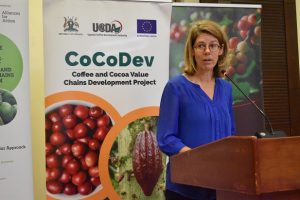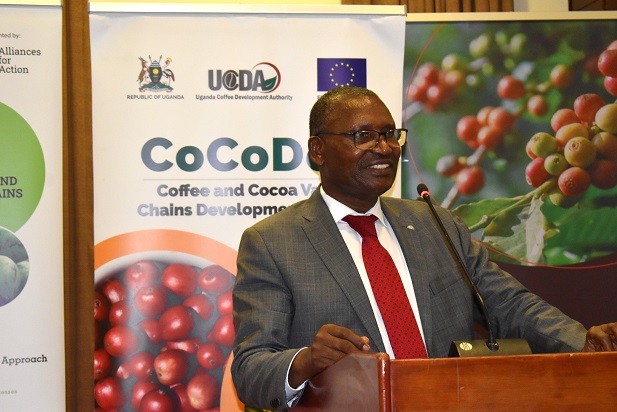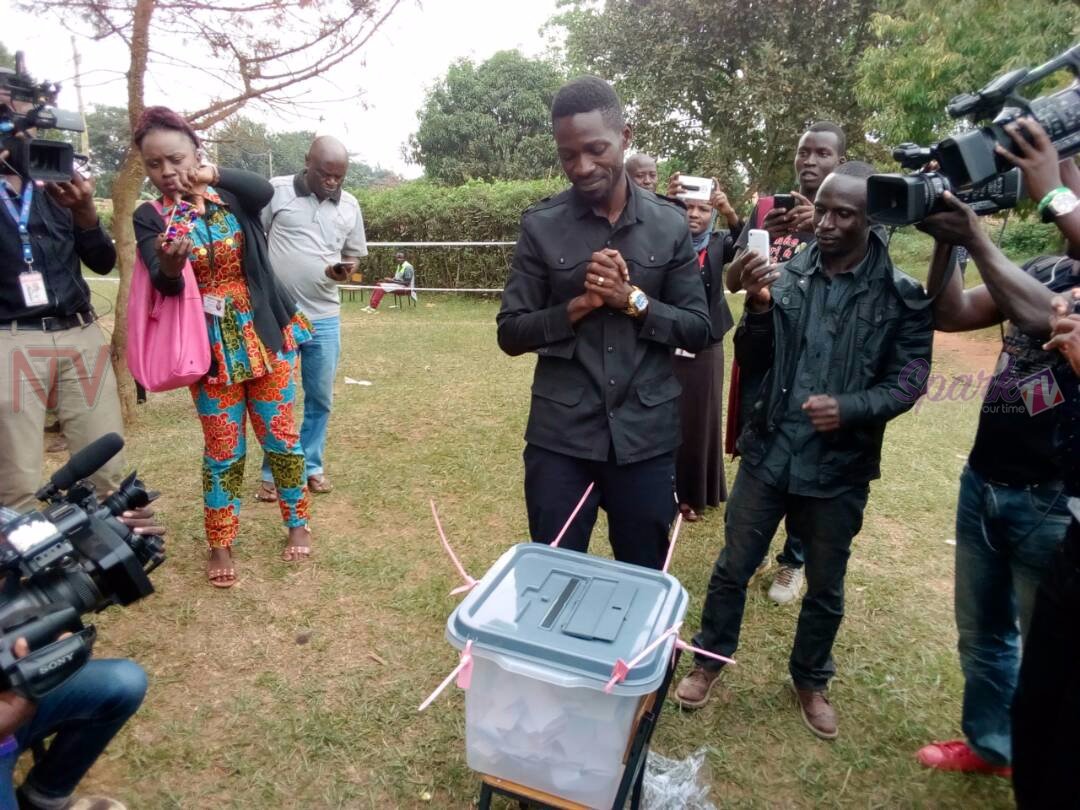Dr Emmanuel Iyamulemye, the UCDA Managing Director
The Government of Uganda is committed to register all coffee farmers and have the National Traceability System in place so as to comply with the European Union Regulations on deforestation-free products (EUDR), Dr Emmanuel Iyamulemye, the Managing Director at Uganda Coffee Development Authority (UCDA), has revealed.
Iyamulemye says the National Coffee Register as provided for in the National Coffee Act 2021, will be a precursor to the creation of a National Traceability System (NTS) aligned with European Union Regulations on deforestation-free products (EUDR) requirements.
The register will assign unique identifiers and geolocations to all coffee farms.
Iyamulemye says Government through the Ministry of Finance, Planning and Economic Development is committed to register farmers in a phased manner.
“The exercise requires up to US$9.15m (Shs35.6bn). The Ministry of Finance has committed to provide up to Shs13bn in the 2024/25 Financial Year towards farmer registration and the National Traceability System,” Iyamulemye said, adding that further funds will be provided in subsequent years.
Iyamulemye was speaking at a stakeholders meeting held at Serena Hotel on Tuesday to validate the National Action Plan for compliance with the Corporate Sustainability Due Diligence Directive (CS3D) and EU regulations on deforestation-free products (EUDR) in the coffee value chain.
The meeting was organized by UCDA, in partnership with International Trade Centre and the Uganda Coffee Federation.
To comply with EUDR requirements, Iyamulemye says, Uganda is using the Territorial Approach (TA) in the short run so as to make the country as a whole compliant.
This approach is not a farmer registration system as no farmer data is collected. It is not a coffee traceability system either.
The TA is based on the premises that; coffee production is not a main driver of deforestation. All coffee polygons (including non-compliant ones) can be identified using High Resolution (HR) maps and Artificial Intelligence (AI). Once non-compliant plots are remediated, the territory (country) is compliant in its entirety.
“We are now engaging the EU to accept the Territorial Approach because the deadline is so short (31st December 2024) for us to have the national register and the National Traceability System where each farmer will have a unique code,” Iyamulemye said.
He said many coffee producing countries including Vietnam, Ethiopia, Peru, Guatemala and Tanzania among others are looking at the Territorial Approach in the short run to comply with EUDR requirements.
“We have to show that there’s something we are doing to comply with EUDR requirements,” he said, adding: “Roasters in the EU want Uganda to be compliant with EUDR requirements because our coffee is of very high quality.”
Iyamulemye revealed that there are already private companies doing voluntary certification and registration of farmers they deal with.
“These farmers get a premium price. We should focus on producing very high quality coffee and comply with all the regulations. Once we do that, the price will even be higher,” he said.
Sanne Willems, the Team Leader Green Transition & Private Sector from the Delegation of the European Union to Uganda, said EUDR is good because it aims to reduce deforestation and address climate change crisis the world is facing.
“Climate change has its impact on coffee production. In certain areas, it’s too hot to produce coffee. We all agree that the background of this legislation is a good one,” Willems says, adding that over 60% of Uganda’s coffee exports go to the EU market.
“The EU market is the biggest for Uganda coffee at the moment and it’s important (for Uganda) to keep it. It’s not so easy to start exporting to other new markets,” she says, adding that the responsibility to ensure coffee exported from Uganda is compliant is with the importers in the EU.

Speaking at the same event, Robert Nangatsa, the Extension Manager at UCDA, said the Traceability System will fundamentally change the coffee sub-sector.
“Once we roll out the Traceability System, how we trade coffee will change significantly. A trader will be required to trace coffee back to the plot where it was grown. Each farmer will be registered in the National Coffee Registry, as per the Coffee Act,” Nangatsa said.
On 5th December 2022, the European Parliament approved a regulation for deforestation-free products to ensure supply chains remain free from products that cause deforestation.
Under the Deforestation Regulation, only products that are legal in the country of production and not linked to deforestation and forest-degradation after 31 December 2020 can be placed on the EU market. The regulation which takes effect on 1st January 2025 requires that exporters of commodities such as coffee, cocoa and their derivatives must submit specific documents to export to the EU market. The regulation sets specific criteria for products imported into and exported out of the EU market to be deforestation-free.
Additionally, the EU’s Corporate Sustainability Due Diligence Directive (CS3D) compels companies to undertake mandatory due diligence to identify and address human rights abuses and environmental damage in their global value chains.






